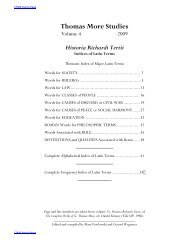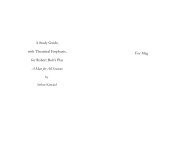life of john picus earl of mirandola - The Center for Thomas More ...
life of john picus earl of mirandola - The Center for Thomas More ...
life of john picus earl of mirandola - The Center for Thomas More ...
You also want an ePaper? Increase the reach of your titles
YUMPU automatically turns print PDFs into web optimized ePapers that Google loves.
5<br />
10<br />
15<br />
20<br />
<strong>More</strong>’s Introduction to Picus’ Second Letter to Francis<br />
I may once bring <strong>for</strong>th the children that I travail on; that I may give<br />
out some books 1 <strong>of</strong> mine own to the common ⌐ pr<strong>of</strong>it ¬ which may<br />
somewhat savour if not <strong>of</strong> cunning yet at the leastwise <strong>of</strong> wit and<br />
diligence. And because ye shall not think that my travail and diligence<br />
in study is anything remitted or slackened, I give you knowledge that<br />
after great fervent labour with much watch and indefatigable travail<br />
I have learned both the Hebrew language and the Chaldee, and now<br />
have I set hand to overcome the great difficulty <strong>of</strong> the Arabic tongue.<br />
<strong>The</strong>se, my dear friend, be things which do appertain to a noble prince,<br />
I have ever thought and yet think. ⌐ Fare ye well. ¬ ¦ Written at Paris 2 the<br />
xv. day <strong>of</strong> October, the year <strong>of</strong> grace 1492. 3<br />
⌐ <strong>The</strong> Argument <strong>of</strong> the Epistle following. After that John Francis, the<br />
nephew <strong>of</strong> Picus, had (as it appeareth in the first epistle <strong>of</strong> Picus to<br />
him) begun a change in his living, it seemeth by this letter that the<br />
company <strong>of</strong> the Court where he was conversant, diversely (as it is their<br />
unmannerly manner) descanted° there<strong>of</strong> to his rebuke, as them thought,<br />
but, as truth was, unto their own. Some <strong>of</strong> them judged it folly, some<br />
called it hypocrisy, some scorned him, some slandered him; all <strong>of</strong> which<br />
demeanour (as we may <strong>of</strong> this epistle conjecture) he wrote unto this<br />
Earl Picus, his uncle, which in this letter com<strong>for</strong>teth and encourageth<br />
him, as it is in the course there<strong>of</strong> evident. ¬<br />
17 descanted made comment on (OED cites this as the first usage in the sense <strong>of</strong> “to make remarks,<br />
comments, or observations; to comment (on, upon…)” [s.v. descant v. 2])<br />
¦ 10 <strong>More</strong> omits the remainder <strong>of</strong> the letter, amounting to n<strong>earl</strong>y two pages in translation (CW<br />
1:353, 355). In these pages, “Picus discusses his plans to visit Rome, Corneo’s marital affairs, Picus’<br />
Italian verses, a wayward servant <strong>of</strong> Picus, and mitigates the amorous escapades <strong>of</strong> an unnamed<br />
lover, evidently Picus himself, who had abducted Margherita, the wife <strong>of</strong> Guiliano Mariotto<br />
dei Medici, on May 10, 1486. She was pursued by her husband, restored to him, and Picus was<br />
wounded and imprisoned. For an account <strong>of</strong> this episode see Eugenio Garin, Giovanni Picus della<br />
Mirandola: Vita e dottrina, Pubblicazioni della Università degli Studi di Firenze, Facoltà di Lettere<br />
e Filos<strong>of</strong>ia, 3 serie, 5 (Florence, 1937), p. 25. <strong>More</strong> could have learned <strong>of</strong> this abduction from<br />
Colet or Linacre, both <strong>of</strong> whom were in Italy not long after this well-known scandal” (CW 1:236).<br />
1. children…books: Gianfrancesco’s Latin uses liberos once (CW 1:352), a word that means both<br />
“children” and “books.” <strong>More</strong> draws attention to the pun by his translation, “books <strong>of</strong> mine own.”<br />
2. Paris: A mistranslation <strong>of</strong> Perusiae, “Perugia” (CW 1:354).<br />
3. <strong>The</strong> date is incorrect. This letter was written in 1486, the year be<strong>for</strong>e Picus’ conversion.<br />
Edwards lists two reasons given by scholars as to why <strong>More</strong> may have intentionally altered the<br />
date, which was present on the Latin text: 1) “to make Picus into a more appropriate spiritual<br />
hero by passing over the time [<strong>of</strong>]…his confrontation with papal authority”; and 2) a concern<br />
“to disassociate Picus from the other controversial event <strong>of</strong> 1486, his kidnapping <strong>of</strong> Margherita<br />
dei Medici” (CW 1:236).<br />
37<br />
[88]











